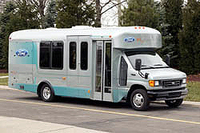Ford Launches Production of Hydrogen Internal Combustion Engines for Delivery to Customers
* Ford will be the first in the world to deliver a dedicated hydrogen
internal combustion engine powered vehicle to commercial customers in E-450
shuttle buses later this year.
* Production of dedicated hydrogen fueled
V-10 engines begins at Ford's Engine Manufacturing Development Operations
in Dearborn Heights; engine tested to same production standards as other
Ford engines.
* Ford is the only automaker active in developing advanced
gasoline hybrid-electric vehicles, hydrogen internal combustion engine
vehicles, clean diesel, ethanol and hydrogen fuel cell-powered vehicles.
DEARBORN HEIGHTS, MI - July 17, 2006: Ford today kicked off production of dedicated hydrogen fueled V-10 engines, making it the first automaker in the world to do so.
"This engine represents a significant milestone in Ford's research efforts in hydrogen technology," said Dr. Gerhard Schmidt, vice president, Research & Advanced Engineering, Ford Motor Company. "We have learned a great deal about hydrogen powered internal combustion engines during the development phase of this engine."
 |
The supercharged 6.8-liter V-10 engine will power Ford's E-450 hydrogen fueled shuttle buses. The buses are scheduled to be delivered to fleet customers later this year, first in Florida and then in other locations across North America. Hydrogen internal combustion engine technology represents an important step toward enabling hydrogen to become a viable motor fuel.
Hydrogen fueled internal combustion engines have many advantages including high efficiency, all-weather capability, and near zero emissions of regulated pollutants and greenhouse gases (CO2). They can also be easily hybridized for further gains in fuel efficiency.
While the hydrogen internal combustion engine shuttle buses will provide valuable real-world experience, Ford is also conducting research into next generation hydrogen internal combustion engines, including features such as direct injection to enhance power and fuel economy. "We have only scratched the surface in terms of what can be achieved with hydrogen internal combustion engine technology and are serious about maintaining our edge in this field," said Vance Zanardelli, chief engineer, Hydrogen Internal Combustion Engines, Ford Motor Company.
Hydrogen Part of a Broader Effort
Ford's strategy for alternative fuels is built around multiple technologies, including hydrogen internal combustion engines. This flexible approach allows the company to meet goals for customer needs, environmental impact and shareholder interests. The strategy does not focus on one catch- all solution, but offers a flexible array of options, including hybrids, clean diesels, bio-diesels, advanced engine and transmission technologies and E85 ethanol.
Ford's first hydrogen internal combustion engine demonstration vehicle, released in 2001, was based on a lightweight aluminum sedan body, which also was used in the development of hydrogen fuel cell technology. Subsequent projects included the Model U concept, first showcased at the 2003 North American International Auto Show, several Focus based demonstration vehicles, a V-6 powered tractor in use at Orlando International Airport as well as two hybridized transit buses. At the 2006 North American International Auto Show, Ford displayed the Super Chief Concept, which demonstrated Tri-Flex technology, which allows a vehicle to run on hydrogen, E85 ethanol or gasoline.
Ford partner Mazda recently delivered its RX-8 Hydrogen RE to its first two corporate customers. These vehicles, equipped with a rotary engine, feature a dual-fuel system that allows the driver to select either hydrogen or gasoline with the flick of a switch.
Additionally, the company also has a fleet of 30 hydrogen powered Focus fuel cell vehicles on the road as part of a worldwide, seven-city program to conduct real world testing of fuel cell technology. The 30-car fleet has accumulated more than 240,000 miles since its inception.
Ford also offers gasoline-electric hybrids including the Escape Hybrid and Mercury Mariner Hybrid. The company will also offer hybrid versions of the Ford Fusion and Mercury Milan in 2008.



